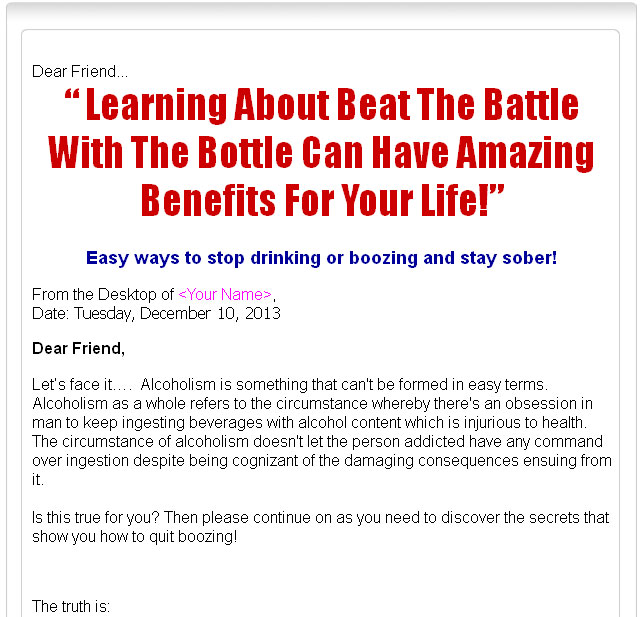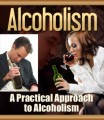Salespage Snapshot:

>>> Click Here To View Full Sales Page…
Table Of Contents
Foreword
Chapter 1:
Understanding Alcohol Dependence
Chapter 2:
Treatments For More Severe Problems
Chapter 3:
Alternate Treatment For Alcohol Abuse
Chapter 4:
Money Saving Tips
Chapter 5:
AA
Sample Content Preview
Symptoms
You are able to make out an individual who has been boozing severely with assorted symptoms he presents. These symptoms increase over a time period. Early signs if left unattended might lead to alcohol abuse and finally to alcohol dependence. Inebriation is the state an individual arrives at when he’s inebriated. Drunkenness is accomplished by ingesting alcohol to the extent that it impairs the physical and mental faculties of an individual.
Symptoms early on include instability in the gait, hapless or no coordination, slurring of speech, reddening of the eyes, red look on the face, frequent hiccoughs, becoming incognizant of surroundings and consequently uninhibited and behavior which isn’t characteristic of the individual. This successively brings on a lot of stress for the loved ones and friends of the individual concerned.
The individual who’s intoxicated likewise exhibits swaying emotions. While he’s furious one moment he becomes sad and brooding the next. Depression sways to euphoria in a brief span of time. He’s depressed and pondering one moment and jolly, high-spirited and light hearted the next.
Hangover the following day is a different condition whereby the drinker might suffer from piercing headaches, nausea, vomiting and is really uncomfortable. In order to cut through these symptoms, a few drinkers take another drink early in the morning time.
Drunkenness or inebriation isn’t a disease but merely a temporary state resulting from unreasonable alcohol consumption.
Being truthful is the first requirement for diagnosing alcohol related issues if any. The drinker must be honest in his answers when he’s being queried about his feelings, pattern of drinking, thought process, and so forth.
This is really crucial as the first thing any drinker will tend to do is to deny any sort of an issue. They tend to put in every effort to convince the individual who’s questioning them that they don’t have any issue which requires treatment. All drinkers protest treatment.
According to psychiatrists, genes play a crucial role in the development of alcoholism. Particular body and brain actions and the way they interact with one another and with the individuals experiences in life influence his vulnerability toward this habit or shelter from it. Particular genes related to alcoholism have likewise been discovered.
Copious research has demonstrated that a variation of the dopamine receptor genes in mortals produces a tendency toward opiates and endorphin releasing drugs and alcohol.
Gamma-aminobutyric acid or GABA is a different repressive neurotransmitter in the brain stated to be associated with alcoholism. Studies have demonstrated that a particular enzyme called glutamate decarboxylase or GAD plays a major part as a synthesizer of this GABA. GABA plays the role of cutting down the excitement stimulating neuro activities in the brain thereby presenting a stable and calm feeling. Alcohol intake has demonstrated to increase the level of GABA allowing for a calm and numb feeling to the drinker.
As one begins ingesting alcohol more and more, the counter mechanism that kicks in reduces the GABA output thereby pushing the drinker to step-up his alcohol intake. According to researchers, genetic background plays a major function in inciting an individual toward alcoholism. This occurs when there’s a production of physical and psychological memories in an individual creating a hunger for alcohol in the body.
Synopsis
Alcohol addiction is more a “disease of the mind”. There are few medical treatments for this circumstance. All the same, alcoholism may be effectively cared for with the help of assorted rehabilitation and support plans that are available.
The only requirement to get treated for alcohol addiction is for the individual impacted to have a desire to come out of the substance abuse. This is the opening move toward freedom from the habit.
For More Serious Conditions
Social and family pressing may make an alcoholic abandon drinking for a time period, but it’s commonly not lasting. The alcoholic has to therefore determine to give up the substance abuse voluntarily.
Alcoholics who volunteer for treatment experience at least one set back before he totally abandons the habit of drinking. The most beneficial thing an addicted individual may do once he or she has resolved to quit the habit is seek help. The strength and support that you’ll decidedly need to cease the habit can be furnished by professionals.
The route is really tedious but the goal is worth it. It isn’t very simple to come out of the substance abuse… which will release the alcoholic one minute and lure him the next. One moment the individual will feel as though he or she’s in complete command and the next moment denial will kick in. The very feelings of shame will tempt them into going in for the drink.
Emotional agitation will accompany physical thirsting and inside no time the addict will be in a jam. The individual looking to stop drinking consequently can’t do it on his or her own. They decidedly need the strong support of good addiction professionals.
When the individual under treatment is exposed to conditions where he’s offered a drink, he or she needs professional help to acquire a mind solid enough to say no. There are a lot of pros who effectively guide the patients through spots like this helping them make the correct decisions with a solid mind.
Various counseling sessions address such subjects preparing the addict to effectively manage spots like this. Counseling may be individual, family or group related.
An addict may either admit himself in the clinic or find treatment as an outpatient. Outpatient plans are helpful for individuals who have already gone through treatment and want the support of group therapies and counseling. It’s really crucial for the addict to choose a clinic or a program which is certified.
An alcoholic who’s experiencing heavy withdrawal symptoms needs to inevitably get himself admitted in the clinic as an inpatient. At first drugs are dispensed to effectively deal with physical symptoms. If the loved ones of the addict aren’t supportive in his effort to give up drinking, it’s a goodness idea to get himself admitted and take the help of the counselors and therapists there.
Alcohol treatment professionals are a blessing for alcoholics who are wishing to make an effort to abandon this undesirable habit. These professionals likewise send the person on to various alcoholic anonymous groups nearby so the support and help can continue as long as he or she needs it.
Lately, the drug Naltrexone has been acknowledged to treat individuals who are stricken with the condition of alcoholism. Along with traditional treatment if taken, this drug has been shown to help the alcoholic in subduing his condition. It has to be prescribed by a doctor. Naltrexone acts upon that part of the brain which is tangled in getting the individual addicted to drugs and toxins. This drug must be taken for a period of 7 to 10 days. The difference is felt after 3 to 4 days when the need for ingestion of alcohol reduces in the body. Inside a week or two the individual will discover that he may survive fine without ingesting his drink.
One crucial thing to be noted however is that the moment the drug is finished; the individual might out of habit reach for his drink. Consequently, it’s really crucial to manifest sufficient lifestyle changes in order to balance out the treatment. It’s consequently advisable for an individual beginning on his naltrexone drug to be under the care of an experienced doctor or a counselor during and after his treatment length.
All medications that are prescribed to treat the condition of unreasonable drinking work at lowering the level of serotonin in the brain. Bringing down the serotonin level is an effective beginning step in individuals afflicted with a serious condition of alcoholism.
Other Details- 1 Ebook (DOCX, PDF), 29 Pages
- Ecover (JPG)
- 1 Salespage (HTML)
- Affirmations(DOC)
- Tip Sheet(DOC)
- File Size: 19,517 KB














